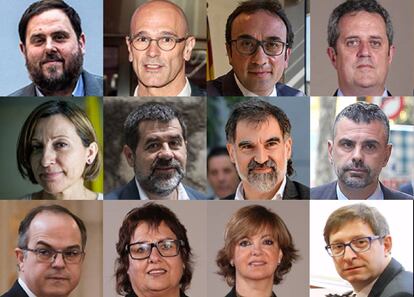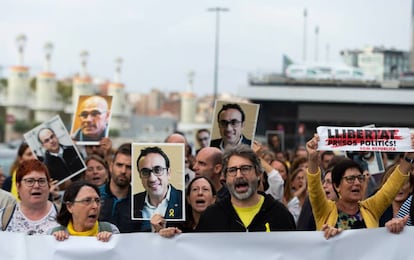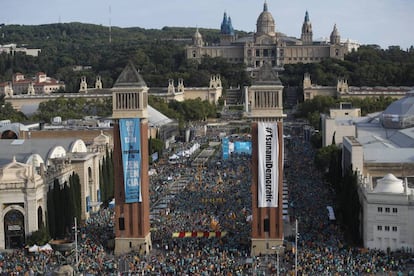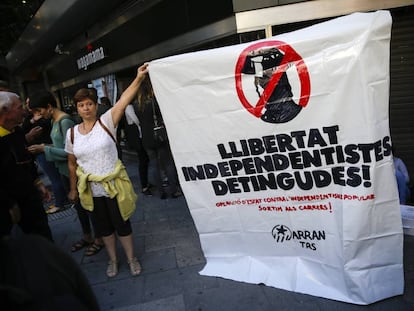Supreme Court finds jailed Catalan secession leaders guilty of sedition
None of the defendants has been convicted of the most serious charge, rebellion, but most are still facing prison terms ranging from nine to 13 years. Those who will serve jail time are eligible for a semi-open regime, a decision that will now be made by penitentiary authorities in Catalonia

The Spanish Supreme Court has sentenced nine Catalan separatist leaders to between nine and 13 years in prison after finding them guilty of sedition in connection with the unilateral breakaway attempt of October 2017.
None of the defendants was convicted of rebellion, the most severe of the charges that they had been facing, entailing prison terms of up to 25 years. The court has found that there were “undeniable acts of violence” in Catalonia in the fall of 2017, but that these were not severe enough to convict the defendants of rebellion. The events that took place were not enough “to impose an effective territorial independence and the derogation of the Constitution.”
The defense teams have already announced that they will appeal the decision before the Constitutional Court as well as the European Court of Human Rights
The court has also left the door open to the possibility of a semi-open prison regime that would allow convicted individuals to spend only the nights of Monday through Thursday in jail. The justices have ignored the prosecution’s request for specific instructions to the effect that prisoners would only be eligible for the tercer grado after serving half of their prison term. It is now up to penitentiary authorities in Catalonia to decide whether the convicted individuals are granted this regime, which could go into effect from Monday. Prosecutors could appeal this decision. All nine have been held in prison since late 2017, a decision the courts made based on flight risk and potential to reoffend, among other reasons.
Oriol Junqueras, the leader of the Catalan Republican Left (ERC) party and the deputy premier of Catalonia at the time of the breakaway bid, is facing the highest prison term: 13 years for sedition and misuse of public funds. Three other ex-government ministers – Raül Romeva, Jordi Turull and Dolors Bassa – have been sentenced to 12 years in prison and a 12-year ban on holding public office. They have also been convicted of sedition and misuse of public funds, aggravated due to the amount of money involved.
Two other ex-cabinet members, Josep Rull and Joaquim Forn, have been acquitted of misusing public funds, and are facing a 10-and-a-half year prison term for sedition. The former speaker of the Catalan parliament, Carme Forcadell, has been sentenced to 11 years and six months for sedition. Jordi Sànchez and Jordi Cuixart, the leaders of the civil society groups ANC and Ómnium, have been sentenced to nine years in prison and given a nine-year ban on holding public office.

Three defendants who were not held in preventive prison because they faced lesser charges have been acquitted of misusing public funds. Santiago Vila, Meritxell Borràs and Carles Mundó have instead been found guilty of disobedience, and ordered to pay a fine rated at 10 months, or €200 per day. They are also barred from holding public office for one year and eight months.
The defense teams have already announced that they will appeal the decision before the Constitutional Court as well as with the European Court of Human Rights.
The ruling ends one of the most politically relevant trials that Spain has seen in recent years. Nine separatist leaders have been in custody for nearly two years following their arrest in late October 2017. Six more ex-government officials, including Carles Puigdemont, the former Catalan premier who headed the breakaway bid, fled Spain to avoid arrest and have not been tried for their role in the secession attempt. The Supreme Court hopes to do so in the coming months, once international and European arrest warrants against them are reactivated following the release of the ruling on Monday.
A mega-trial
The trial concluded in mid-June after four months of hearings and testimony from around 400 witnesses. At the end of it, neither the accusation nor the defense had substantially altered their original positions. All 12 defendants held that they were on trial because of their ideas; they said their only aim had been to give Catalan citizens a chance to express themselves through a referendum, and called for political dialogue with the central government in Madrid as the only way out of the conflict.

But the prosecution said during the closing arguments that the accused were being tried not for their ideas but for their actions, which were described as a failed coup that tried to liquidate the Constitution of 1978 and “seriously attacked the constitutional order via illegal procedures.” These included a referendum that went ahead despite an unfavorable judgment by the Constitutional Court, and laws to facilitate the transition to a Catalan republic.
In late October 2017, the separatist majority in the Catalan parliament read out an independence declaration that triggered the temporary suspension of regional powers and the removal of the entire Catalan government team until new elections were held and a new premier – Quim Torra, also a separatist – appointed.
On October 1 of this year, the separatist government observed the second anniversary of the unauthorized independence referendum with a public address that urged citizens to revive the spirit of the breakaway bid in order to advance toward a Catalan republic and address “the challenges of the future,” a reference to the Supreme Court decision. Pro-independence groups also read out a manifesto calling for a “massive response based on non-violent struggle and civil disobedience” to the ruling, which the independence movement had widely expected to be adverse.
Leaders of the regional police force, the Mossos d’Esquadra, said they are are concerned about the potential scope of prolonged protests by the separatist movement, such as those announced by a civil society group that calls itself Tsunami Democràtic, which has no visible leaders and is organizing the response to the court ruling.
English version by Susana Urra.
Tu suscripción se está usando en otro dispositivo
¿Quieres añadir otro usuario a tu suscripción?
Si continúas leyendo en este dispositivo, no se podrá leer en el otro.
FlechaTu suscripción se está usando en otro dispositivo y solo puedes acceder a EL PAÍS desde un dispositivo a la vez.
Si quieres compartir tu cuenta, cambia tu suscripción a la modalidad Premium, así podrás añadir otro usuario. Cada uno accederá con su propia cuenta de email, lo que os permitirá personalizar vuestra experiencia en EL PAÍS.
En el caso de no saber quién está usando tu cuenta, te recomendamos cambiar tu contraseña aquí.
Si decides continuar compartiendo tu cuenta, este mensaje se mostrará en tu dispositivo y en el de la otra persona que está usando tu cuenta de forma indefinida, afectando a tu experiencia de lectura. Puedes consultar aquí los términos y condiciones de la suscripción digital.










































